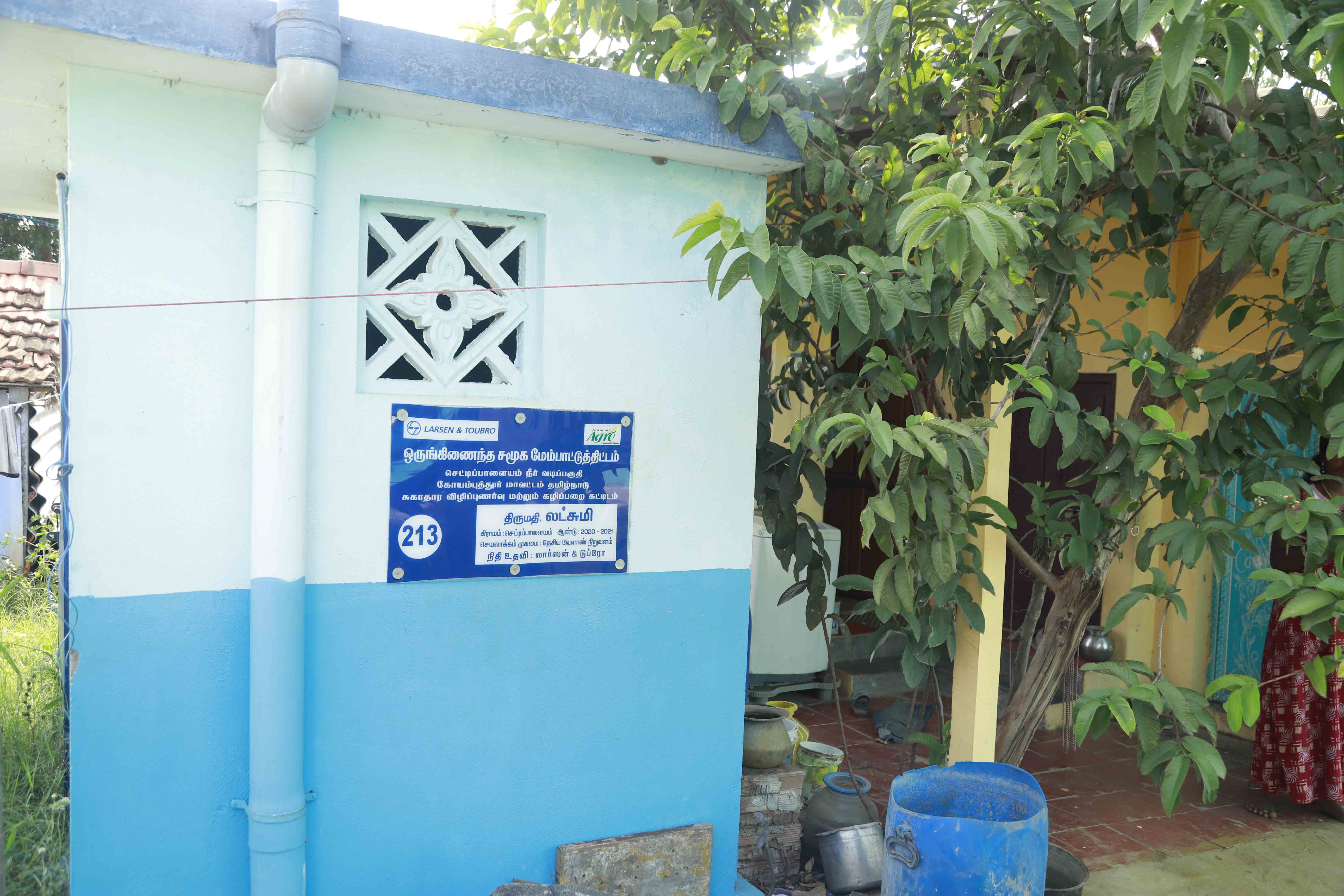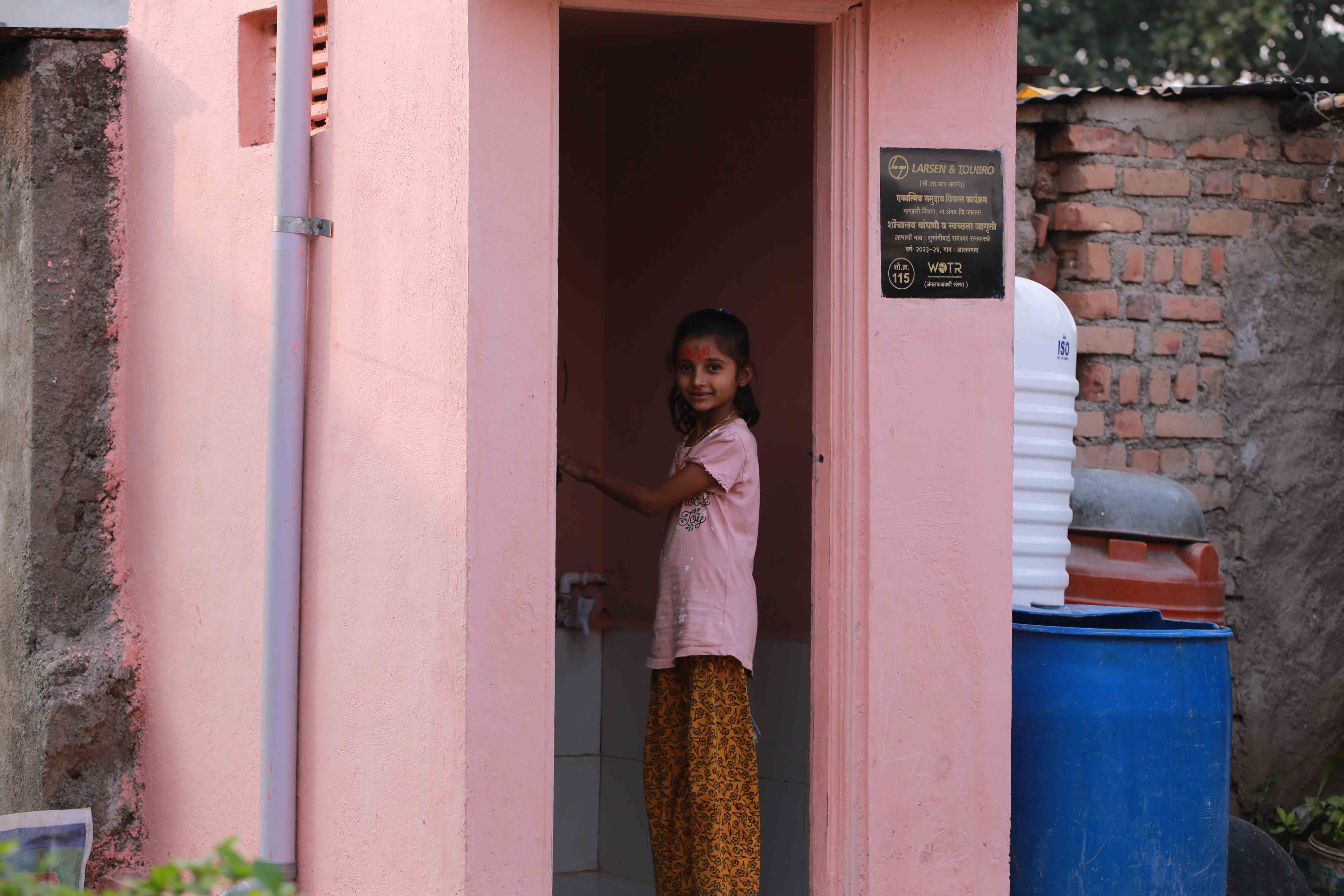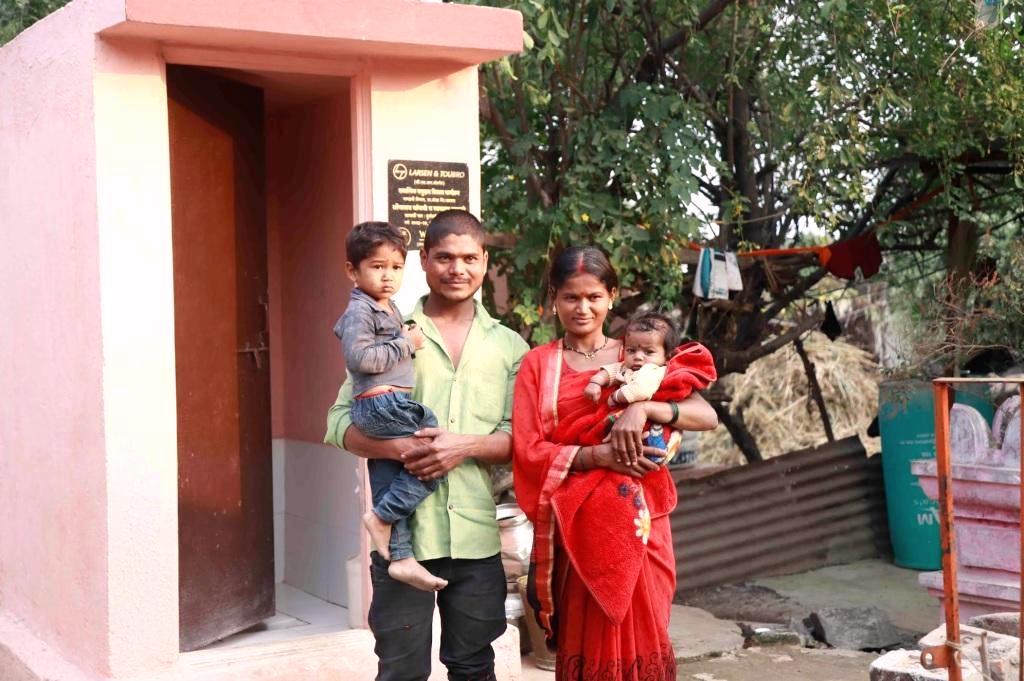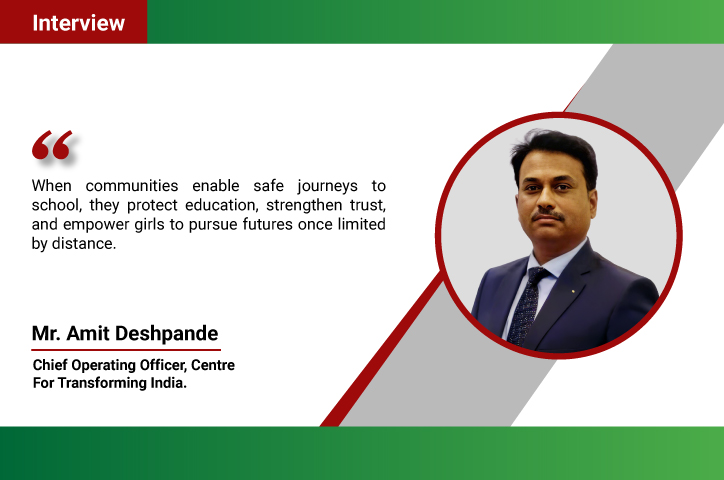The Parched Earth and a Vision of Progress
 For countless communities across rural India, the relentless struggle against water scarcity casts a long shadow over their lives, impacting everything from livelihoods to basic sanitation. In 2015, Larsen & Toubro embarked on a mission to address this critical challenge with the launch of Project Unnati, an Integrated Community Development Programme. As Mabel Abraham, Head – CSR, Larsen & Toubro, articulated, the core vision was to "address the challenges faced by severely water-stressed areas... focus on areas where others had not yet reached," with the fundamental belief that "water security" would serve as the essential "entry point" to a more holistic and sustainable future for these regions, encompassing education, health, and livelihoods.
For countless communities across rural India, the relentless struggle against water scarcity casts a long shadow over their lives, impacting everything from livelihoods to basic sanitation. In 2015, Larsen & Toubro embarked on a mission to address this critical challenge with the launch of Project Unnati, an Integrated Community Development Programme. As Mabel Abraham, Head – CSR, Larsen & Toubro, articulated, the core vision was to "address the challenges faced by severely water-stressed areas... focus on areas where others had not yet reached," with the fundamental belief that "water security" would serve as the essential "entry point" to a more holistic and sustainable future for these regions, encompassing education, health, and livelihoods.
A Deliberate Design: Phased Development and Community at the Core
Unnati’s blueprint was not a one-size-fits-all solution but a carefully considered, phased approach. "Once water security was achieved," Mabel Abraham explained, "we would then gradually expand to work on education, health, and livelihoods." This sequential model acknowledged the foundational role of water in enabling broader progress. Recognizing that true and lasting change must be driven from within, L&T positioned itself as a "catalytic agent," empowering communities to take ownership of their development journey. The initial groundwork involved an intensive DPR process, dedicating four to six months to in-depth community interaction" to truly understand the local context, aspirations, and indigenous knowledge.
Navigating Challenges, Harvesting Solutions
The path to progress was not without its obstacles. Identifying committed partners and fostering genuine community engagement proved to be significant hurdles. "A major hurdle was finding NGO partners who not only shared L&T’s vision but also had a long-term commitment," Mabel Abraham noted, adding that "equally challenging was securing buy-in and engaging local communities, who initially remained passive observers." The key to overcoming this lay in the meticulous DPR process and a sustained commitment to transparent communication. By ensuring the community "understood its purpose and how it could benefit them," and by actively listening to their feedback, Unnati was able to tailor its interventions effectively. The tangible results speak volumes: the implementation of soil and water conservation measures led to a remarkable 14.64-metre average increase in well water levels from FY2018-19 to FY2024-25," a testament to the project's impactful solutions.
Transforming Agriculture: Irrigation as a Catalyst for Livelihoods
Beyond improving water tables, Unnati’s interventions have directly transformed agricultural outcomes. Through the establishment of robust irrigation infrastructure, the project has successfully brought over 6,707 acres under irrigation, benefiting 754 farmers across the intervention areas. This has not only boosted cropping intensity but has also opened up new livelihood opportunities, enabling farmers to diversify crops, increase productivity, and enhance household incomes — a clear demonstration of how water security can catalyze economic resilience.
Empowering the Grassroots: Cultivating Local Leadership
At the heart of Unnati’s success lies its commitment to empowering local communities. This began with the formation of inclusive Village Development Committees, designed to reflect the diverse voices within each village. As Mabel Abraham highlighted, these committees included "youth representatives, small and marginal farmers, landless labourers" with a clear mandate that "at least 30 percent of members be women." While initially challenging to ensure women's participation, L&T’s firm stance underscored its belief in their crucial role. "In some instances," Mabel Abraham recalled, "we had to state clearly that the committee would not be accepted unless women were part of it." This ultimately fostered a deeper understanding of inclusivity. To equip these local leaders, Unnati provided comprehensive training, covering technical aspects like "rainfall, water budgeting, and crop production estimation," alongside invaluable exposure visits to successful project sites.
Sanitation as Dignity: A Community-Driven Transformation
 Recognizing the profound impact of sanitation on health and dignity, Unnati embarked on a mission to make communities "open-defecation-free." Mabel Abraham explained that this involved "creating demand for sanitation within the community" through culturally relevant "awareness campaigns" utilizing local art forms. Working with schools and women's Self Help Groups proved particularly effective in disseminating the message. The project often began by supporting the "underserved who can't afford to build toilets," creating a powerful demonstration effect that inspired others. The emphasis on quality construction and the training of local masons further fueled this transformation. Since 2017, Unnati has facilitated the construction of 4,456 individual household toilets and over 2,700 community-financed toilets," leading to an impressive 41 villages achieving Open Defecation Free status, marking a crucial improvement in public health and hygiene standards in the target regions.
Recognizing the profound impact of sanitation on health and dignity, Unnati embarked on a mission to make communities "open-defecation-free." Mabel Abraham explained that this involved "creating demand for sanitation within the community" through culturally relevant "awareness campaigns" utilizing local art forms. Working with schools and women's Self Help Groups proved particularly effective in disseminating the message. The project often began by supporting the "underserved who can't afford to build toilets," creating a powerful demonstration effect that inspired others. The emphasis on quality construction and the training of local masons further fueled this transformation. Since 2017, Unnati has facilitated the construction of 4,456 individual household toilets and over 2,700 community-financed toilets," leading to an impressive 41 villages achieving Open Defecation Free status, marking a crucial improvement in public health and hygiene standards in the target regions.
Building for the Future: Ensuring Long-Term Sustainability
Unnati’s vision extends far beyond immediate interventions. Sustainability is woven into its very fabric, beginning with a strategic focus on water security in the initial phases. "The first 18 months to two years are focussed solely on water," Mabel Abraham emphasized, before sanitation initiatives even begin. The establishment of robust community-based institutions like VDCs and SHGs is paramount in ensuring long-term ownership and maintenance. As Mabel Abraham aptly stated, "when the community realises that having a toilet is a cleaner, healthier, and more hygienic option, the need for external persuasion diminishes." The focus on constructing durable household toilets fosters a sense of pride and encourages continued upkeep, a testament to the project's lasting impact.
Measuring Progress, Charting the Future
Accountability and impact assessment are integral to Unnati’s framework. "One of the main indicators we track is groundwater levels," Mabel Abraham highlighted, utilizing observatory wells to monitor progress. The remarkable 20.9 MCM of water conserved since FY2015-16 underscores the project's effectiveness in this crucial area. Beyond water, Unnati also tracks agricultural productivity and the meaningful engagement of women in SHGs. This comprehensive monitoring allows for continuous learning and adaptation.
Scaling the Success: A River Basin Approach
L&T’s ambition for Unnati extends beyond its current operational areas. The replication strategy is thoughtfully centered around "a geographical approach centred around river basin rejuvenation." Mabel Abraham elaborated, "we prioritise expanding within existing regions by targeting specific river basins," creating a "demonstration effect" that encourages neighboring villages to adopt similar practices. The success seen around rivers in Rajasthan, the Rajsamand Lake tributaries, river basins in Maharashtra, and the Noal River Basin in Coimbatore exemplifies this strategic scaling. Let's take a look at each in detail:
- In Rajasthan, activities cover areas like Bheem and Kumbhalgarh, targeting river basins with improved water harvesting and soil-water retention practices, creating a demonstration effect encouraging surrounding villages to adopt similar methods independently.
- In Sevantri, work extends downstream into streams feeding the Rajsamand Lake, following this geographical logic.
- Villages supported in Jalna and Aurangabad contribute to recharging local river basins.
- In Coimbatore, interventions centre on the Noal River Basin.
This model allows natural scalability through community-led adoption and ecosystem-focused impact. While new states may be considered in future, current efforts concentrate on deepening impact in these selected geographies.
A Holistic Vision: Integrating with Broader CSR Goals
Unnati is not an isolated initiative but seamlessly integrates with L&T’s wider CSR strategy, addressing the interconnected needs of rural communities. "While the core framework of Unnati is consistent," Mabel Abraham explained, "the interventions are tailor-made for each region." This is evident in the tailored education programs in Rajasthan, Maharashtra, and Tamil Nadu, and the region-specific health interventions:
In Rajasthan, many children from migrant families remain out-of-school and risk child labour. To combat this, bridge courses and intensive residential camps are run, closely involving families to reintegrate about 200 children into formal education over the years.
Maharashtra’s focus is on strengthening school infrastructure and supporting vulnerable students, particularly girls from single-parent families vulnerable to early marriage, as enrolment is high but learning outcomes lag behind.
Tamil Nadu benefits from relatively strong enrolment and retention; here, Unnati concentrates on improving infrastructure such as school toilets and promoting STEM-based enhanced learning.
Health Interventions Based on Regional Needs
Health efforts are also customised:
Rajasthan focuses on improving nutrition in Balwadis and Anganwadis through supplementary feeding and connecting with government schemes like ICDS. Strengthening ASHA workers’ outreach and educating mothers on balanced diets are key activities.
Maharashtra shares some of these challenges but to a lesser extent, while Tamil Nadu requires fewer interventions in nutrition.
Aligning with National Progress: Contributing to National Missions
Project Unnati actively contributes to national missions like Swachh Bharat Abhiyan, Jal Jeevan Mission, and Har Ghar Jal Yojana by "actively connecting rural communities to government schemes and building their capacity to sustain these efforts independently," according to Mabel Abraham. By facilitating access to government resources and empowering local communities, Unnati amplifies the reach and impact of national initiatives.
For instance, in water-stressed areas, the project helps farmers access government-supported irrigation solutions like drip and sprinkler systems. Village Development Committees are trained to navigate these schemes, ensuring sustainability even after active project involvement ends. Similarly, in animal husbandry, communities are guided to utilise government services such as livestock vaccination, health camps, and veterinary support, enhancing animal health and productivity.
This cooperative approach fosters stronger collaboration with local government officials, including Block Development Officers and district collectors, who appreciate engaging with informed and proactive communities.
The Power of Collaboration: Strategic Partnerships
The success of Unnati is further amplified through strategic collaborations. Mabel Abraham emphasized that partners like the National Agro Foundation bring "skill sets and expertise, such as engaging with communities, identifying the most underserved stakeholders, and serving as their voice." However, finding NGO partners who not only shared L&T’s vision but also demonstrated a long-term commitment posed a significant challenge in the early stages. Many potential partners lacked the sustained dedication necessary for such an enduring initiative. Equally important was overcoming the initial passivity among local communities, who began as passive observers despite the programme’s community-driven philosophy.
Recognizing its role as a catalytic agent rather than a director of change, L&T undertook an extensive DPR process lasting four to six months prior to project launch. This involved intensive community interaction, including regular meetings to understand residents’ perspectives, aspirations, and problem-solving ideas. Once underway, consistent efforts ensured that communities comprehended the project’s benefits, with active listening and feedback mechanisms enabling the programme to evolve responsively. These steps were critical in securing genuine buy-in and sustained engagement. Through these strategic partnerships and community-driven processes, the programme strengthened its outreach and impact, facilitating valuable knowledge sharing and ensuring that interventions were both relevant and owned by the people they served.
Voices of Transformation: Stories that Inspire
The true impact of Unnati is best reflected in the lives it has touched across diverse regions. One compelling story is that of 75-year-old Shahubai from Sadesavangi village in Maharashtra. Until recently, Shahubai managed without a toilet in her home, a hardship worsened by ongoing drought conditions and her poor health. In 2023–24, thanks to Unnati’s intervention, a sanitation facility was constructed for her household, significantly improving her family’s hygiene and restoring dignity to her daily life—demonstrating how community-led sanitation efforts can bring tangible, immediate benefits.
In Rajasthan’s Kumbhalgarh block, 17-year-old Radha Bhil from Hatta Ji Ka Guda faced life’s challenges with physical disability and the loss of both parents. Without access to a toilet, her vulnerability was pronounced. In 2022–23, the Gram Vikas Committee, in partnership with Seva Mandir and L&T under the Unnati initiative, built a toilet at her home in her sister-in-law Kanchan’s name. This thoughtful intervention provided Radha with a safe, private space, enhancing her hygiene, dignity, and independence.
Agricultural transformation stories are equally inspiring. In Devgaon, Mr. Sarjerao, a 49-year-old farmer cultivating cotton, sorghum, and millet on two acres, struggled with water scarcity. By adopting drip irrigation through Project Unnati, he boosted cotton yields to 7–8 quintals per acre. Encouraged by this success, 54 farmers in Nagzari and Devgaon embraced drip and sprinkler irrigation techniques, amplifying the project’s impact.
Meanwhile, persistent drought since 2012 challenged Chambharwadi village in Marathwada. Mrs. Latabai Otade, 40, initially reliant on chemical-intensive cotton, tur dal, and vegetable farming on her four-acre plot, transitioned to organic, multi-layered orchard farming with the project’s support. This shift not only saved on market expenses but also produced a surplus of vegetables and fruits, substantially enhancing her income and promoting sustainable practices within the community.
These individual stories of dignity, independence, innovation, and sustainability collectively paint a powerful picture of Unnati’s transformative influence across water-stressed communities.
Conclusion: A Legacy of Empowerment and Resilience
 Project Unnati stands as a compelling success story, demonstrating the profound impact of a phased, community-led approach to rural development. The insights shared by Mabel Abraham underscore the critical importance of deep community engagement, adaptive strategies, and strong collaborative partnerships. The tangible improvements in water security, sanitation, and the empowerment of local communities serve as a testament to L&T’s long-term commitment to creating sustainable and meaningful change in water-stressed regions of India. Unnati is not just building infrastructure; it is cultivating resilience, restoring dignity, and empowering communities to chart their own course towards a brighter future.
Project Unnati stands as a compelling success story, demonstrating the profound impact of a phased, community-led approach to rural development. The insights shared by Mabel Abraham underscore the critical importance of deep community engagement, adaptive strategies, and strong collaborative partnerships. The tangible improvements in water security, sanitation, and the empowerment of local communities serve as a testament to L&T’s long-term commitment to creating sustainable and meaningful change in water-stressed regions of India. Unnati is not just building infrastructure; it is cultivating resilience, restoring dignity, and empowering communities to chart their own course towards a brighter future.





 For countless communities across rural India, the relentless struggle against water scarcity casts a long shadow over their lives, impacting everything from livelihoods to basic sanitation. In 2015, Larsen & Toubro embarked on a mission to address this critical challenge with the launch of Project Unnati, an Integrated Community Development Programme. As Mabel Abraham, Head – CSR, Larsen & Toubro, articulated, the core vision was to "address the challenges faced by severely water-stressed areas... focus on areas where others had not yet reached," with the fundamental belief that "water security" would serve as the essential "entry point" to a more holistic and sustainable future for these regions, encompassing education, health, and livelihoods.
For countless communities across rural India, the relentless struggle against water scarcity casts a long shadow over their lives, impacting everything from livelihoods to basic sanitation. In 2015, Larsen & Toubro embarked on a mission to address this critical challenge with the launch of Project Unnati, an Integrated Community Development Programme. As Mabel Abraham, Head – CSR, Larsen & Toubro, articulated, the core vision was to "address the challenges faced by severely water-stressed areas... focus on areas where others had not yet reached," with the fundamental belief that "water security" would serve as the essential "entry point" to a more holistic and sustainable future for these regions, encompassing education, health, and livelihoods. Recognizing the profound impact of sanitation on health and dignity, Unnati embarked on a mission to make communities "open-defecation-free." Mabel Abraham explained that this involved "creating demand for sanitation within the community" through culturally relevant "awareness campaigns" utilizing local art forms. Working with schools and women's Self Help Groups proved particularly effective in disseminating the message. The project often began by supporting the "underserved who can't afford to build toilets," creating a powerful demonstration effect that inspired others. The emphasis on quality construction and the training of local masons further fueled this transformation. Since 2017, Unnati has facilitated the construction of 4,456 individual household toilets and over 2,700 community-financed toilets," leading to an impressive 41 villages achieving Open Defecation Free status, marking a crucial improvement in public health and hygiene standards in the target regions.
Recognizing the profound impact of sanitation on health and dignity, Unnati embarked on a mission to make communities "open-defecation-free." Mabel Abraham explained that this involved "creating demand for sanitation within the community" through culturally relevant "awareness campaigns" utilizing local art forms. Working with schools and women's Self Help Groups proved particularly effective in disseminating the message. The project often began by supporting the "underserved who can't afford to build toilets," creating a powerful demonstration effect that inspired others. The emphasis on quality construction and the training of local masons further fueled this transformation. Since 2017, Unnati has facilitated the construction of 4,456 individual household toilets and over 2,700 community-financed toilets," leading to an impressive 41 villages achieving Open Defecation Free status, marking a crucial improvement in public health and hygiene standards in the target regions. Project Unnati stands as a compelling success story, demonstrating the profound impact of a phased, community-led approach to rural development. The insights shared by Mabel Abraham underscore the critical importance of deep community engagement, adaptive strategies, and strong collaborative partnerships. The tangible improvements in water security, sanitation, and the empowerment of local communities serve as a testament to L&T’s long-term commitment to creating sustainable and meaningful change in water-stressed regions of India. Unnati is not just building infrastructure; it is cultivating resilience, restoring dignity, and empowering communities to chart their own course towards a brighter future.
Project Unnati stands as a compelling success story, demonstrating the profound impact of a phased, community-led approach to rural development. The insights shared by Mabel Abraham underscore the critical importance of deep community engagement, adaptive strategies, and strong collaborative partnerships. The tangible improvements in water security, sanitation, and the empowerment of local communities serve as a testament to L&T’s long-term commitment to creating sustainable and meaningful change in water-stressed regions of India. Unnati is not just building infrastructure; it is cultivating resilience, restoring dignity, and empowering communities to chart their own course towards a brighter future.






.jpg)



